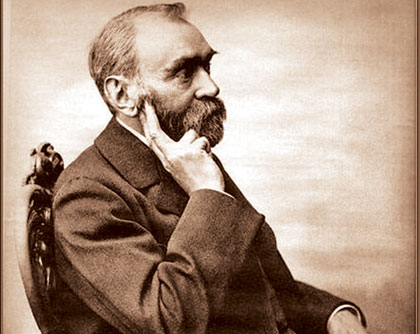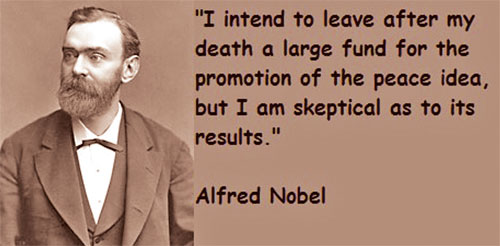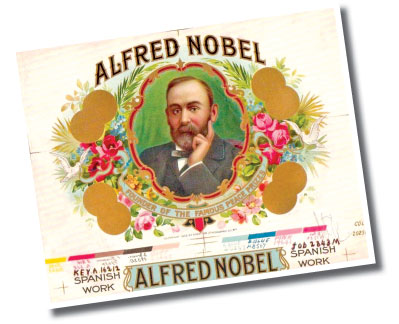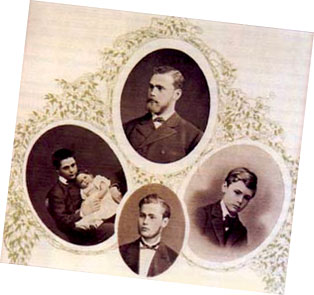Alfred Nobel 1833-1896
Lasting Legacy
 Even today Nobel’s legacy lives on through the annual Nobel Prize
ceremonies, which are held in various parts of Sweden and Norway
annually. These awards honour the best and the brightest, who reflect
Alfred Nobel’s vision of making the world a better place! Even today Nobel’s legacy lives on through the annual Nobel Prize
ceremonies, which are held in various parts of Sweden and Norway
annually. These awards honour the best and the brightest, who reflect
Alfred Nobel’s vision of making the world a better place!
“I intend to leave after my death a large fund for the promotion of
the peace idea, but I am sceptical as to its results.”
-Alfred Nobel
His last Will
In his will of November 27, 1895 signed in Paris, Alfred Nobel
specified that the bulk of his fortune should be divided into five parts
and to be used for Prizes in Physics, Chemistry, Physiology or Medicine,
Literature and Peace to “those who, during the preceding year, shall
have conferred the greatest benefit on mankind.”
The dynamite dynamo

Since 1901, the Nobel Prize has been honouring men and women from all
corners of the globe for outstanding achievements in Physics, Chemistry,
Medicine, Literature, and for work in Peace.
The foundations for the prize were laid in 1895 when Alfred Nobel
wrote his last will, leaving much of his wealth to the establishment of
the Nobel Prize.
But who was Alfred Nobel? This article gives a glimpse of a man whose
varied interests are reflected in the prize he established.
Alfred Nobel never attended any university, nor did he obtain any
degree. His tutorial instruction came to an end as early as 1850.
While his older brothers Robert and Ludvig were busy working in the
family engineering enterprise, Alfred was sent at age 17 out into the
world on educational travels, first to Paris, where – at the
recommendation of his chemistry teacher, Prof Zinin – he worked in the
laboratory of the famous Prof Jules Pélouze. Here he came into contact
with the Italian chemist Ascanio Sobrero, who had discovered
nitroglycerine in 1847. Nitroglycerine possessed violent explosive
power, but no one had devised a solution regarding how to control this
highly dangerous substance.
Alfred’s education continued in the United States where he studied
the latest technological advances. He met John Ericsson, his father’s
countryman and contemporary who had arrived in America the year after
Immanuel reached Russia and whose interests and inventions largely
coincided with the Nobel company’s activities in St. Petersburg.
Returning from his foreign travels in 1852, Alfred joined his two
brothers at their father’s factory in St. Petersburg.
Alfred often suffered from delicate health. Combined with hard work,
this led him to fall ill in the summer of 1854 and he travelled to the
Bohemian spa town of Franzenbad to take the waters.
Together with his father, Alfred had understood the enormous
potential of nitroglycerine as an explosive and tried to develop a form
that was less hazardous and easier to handle. In testimony during one of
the American patent cases that Alfred was involved in many years later,
he explained how he and his father had become
 interested in
nitroglycerine. He was asked: “Do you know of any one before you having
experimented with nitroglycerine?” interested in
nitroglycerine. He was asked: “Do you know of any one before you having
experimented with nitroglycerine?”
His answer:
“Yes, Sobrero who discovered it, also discovered that it was
explosive. Prof Zinin and Prof Trapp in St. Petersburg went a step
further in conjecturing that it might be made useful and called the
attention of my father to it, who was then engaged in making torpedos
for the Russian government during the Crimean War.
“My father tried it, but could not get it to explode.”

The next question:
“When did you first experiment with nitroglycerine, and what did you
do?”
Alfred Nobel’s answer:
“The first time I saw nitroglycerine was in the beginning of the
Crimean War. Prof Zinin in St. Petersburg exhibited some to my father
and me and struck some on an anvil to show that only the part touched by
the hammer exploded without spreading. His opinion was that it might
become a useful substance for military purposes, if only a practical
means could be devised to explode it.
My father tried to explode it during the Crimean war, but completely
failed to do so ... My father’s later experiments with gunpowder mixed
with nitroglycerine were all on a small scale.” The early 1850s were
golden years for the Nobel family. In 1853, Immanuel was presented at
court and awarded Tsar Nikolai’s Imperial Gold Medal “for diligence and
creative skill in Russian industry,” a rare distinction for a foreigner.
After the Tsar’s death in 1855 and the conclusion of the Crimean War
under the Treaty of Paris of March 30, 1856, the new government of
Russia disregarded the promises for orders made by its predecessor.
-Internet |

